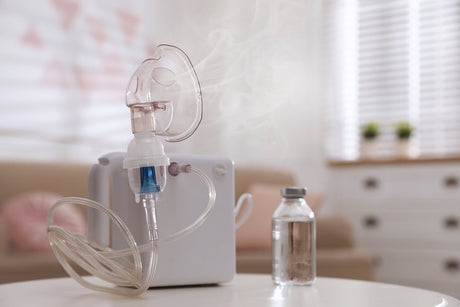Navigating Spring with COPD and Respiratory Allergies

For those already facing the challenges of COPD, the onset of spring isn't just about budding flowers and warmer days; it's the harbinger of a new struggle with respiratory allergies. Here’s how you can prepare to manage these challenges efficiently to ensure that this spring – and every season – comes with a breath of fresh air.
Understanding the Impact of Respiratory Allergies
Respiratory allergies can significantly complicate the daily lives of people living with chronic respiratory conditions like COPD. Springtime, often called the 'allergy season', brings an explosion of airborne allergens that can trigger reactions in all sufferers, particularly those with pre-existing conditions.
The immune system, in an attempt to fight off harmless substances such as pollen, dust mites, or pet dander, can trigger an inflammatory response, causing symptoms such as wheezing, shortness of breath, chest tightness, coughing, and a decreased ability to breathe comfortably. These symptoms mirror those of COPD exacerbation, making it critical to identify the root cause as early as possible.
Knowing the difference between your regular COPD symptoms and those triggered by allergies is the first step towards managing both conditions effectively.
Identifying Allergy Triggers
The list of potential allergens is extensive, and they tend to vary by individual. Common triggers include:
-
Pollen: The fine powdery substance released from plants can be carried vast distances by the wind.
-
Molds: In spring, molds can grow on decaying plant matter, leading to increased spore release.
-
Dust and Dust Mites: Indoor dust and the microscopic organisms it contains can be a persistent issue.
-
Pet Dander: The tiny flecks of skin shed by cats, dogs, and other animals can linger in the air and on surfaces.
-
Certain Foods: Foods can sometimes exacerbate allergic reactions in those sensitive to them.
By being aware of your surroundings and potential allergens, you can better safeguard your respiratory health.
The Connection Between Allergies, Upper Respiratory Infections and COPD
Respiratory allergies and COPD can exacerbate each other, causing a condition known as allergic asthma or even chronic lower airway diseases. Addressing allergies is not only about comfort but also about preventing the progression of existing respiratory conditions.
Recognizing Respiratory Allergy Symptoms and Seeking Prompt Care
The symptoms of respiratory allergies can mimic those of a COPD exacerbation, which can make diagnosis and immediate care crucial. It’s important to be able to differentiate between the two to receive the right treatment.
Recognizing the Symptoms:
-
Allergic Rhinitis: Characterized by a runny or stuffy nose, sneezing, and itching.
-
Allergic Conjunctivitis: Itchy, watery eyes that can also become red and swollen.
-
Allergic Asthma: This variant of asthma is triggered by allergens, resulting in coughing, shortness of breath, and wheezing. Learn more about the difference between COPD and asthma.
If you notice a change in your typical symptoms or suspect an allergic reaction, it's essential to consult your healthcare provider promptly. Do not try to treat it as a typical exacerbation – you may need different medication or adjustments to your COPD treatment.
Shop respiratory supplies
Allergy Management Strategies for COPD Patients
To manage respiratory allergies effectively, consider these strategies:
-
Stay Indoors When Allergens Are High: Keep your windows closed, and operate an air purifier to reduce allergen levels indoors.
-
Wear a Mask: A good quality mask can help filter out allergens when you have to go outside.
-
Shower and Change Clothes After Being Outdoors: This can help remove allergens from your skin and clothing.
-
Manage Your Home Environment: Keep humidity levels low to prevent mold growth and use allergen-proof bedding to manage dust mites.
-
Consult an Allergist: An allergy specialist can help you identify your specific triggers and develop a plan to avoid or manage them.
Medication Options for Allergies in COPD
In mild allergy cases, over-the-counter antihistamines or decongestants can provide relief. However, severe allergy symptoms may require prescription medications, including:
-
Inhaled Corticosteroids: Used to control inflammation in the airways.
-
Leukotriene Modifiers: These medications work by blocking the effects of leukotrienes, which are involved in allergic reactions.
-
Allergy Shots (Immunotherapy): Over time, these injections can reduce the severity of your allergen response.
Your healthcare provider will be able to recommend the best medication for your individual needs.
Spring Cleaning for Your Allergy Management
In the effort to manage both COPD and allergies, spring cleaning takes on a whole new level of importance. A fresh season provides an excellent opportunity to reset your indoor environment and reduce allergen exposure.
Allergy-Proofing Your Home
Follow these steps to allergen-proof your home:
-
Clean Regularly: Dust and vacuum weekly to keep allergens at bay.
-
Use HEPA Filters: High-efficiency particulate air filters can be used in vacuum cleaners and air purifiers to trap allergens.
-
Keep Windows Closed: This is especially important during high-pollen days when keeping windows open can lead to an influx of allergens.
-
Minimize Moisture: Use a dehumidifier to prevent mold growth in damp areas.
-
Remove Clutter: Every object in your home collects dust, so the more things you have, the more dust you'll have to deal with.
A thorough spring cleaning can help you start the season on the right foot. Remember, it's not just about cleanliness; it's about health maintenance.
Shop cleaning supplies
Seasonal Adjustments to Your Environment
When the pollen count is high, several environmental changes can help minimize exposure:
-
Limit Time Outside: Avoid going out during the early morning when pollen levels are at their highest.
-
Dry Your Clothes Inside: Hanging clothes outside to dry can lead to pollen clinging to the fibers.
-
Choose Low-Allergen Plants: If you enjoy gardening, select plant species with low pollen production.
Adapting your home and lifestyle to the season can significantly reduce the impact of allergies on your respiratory health.
Nutrition and Exercise for Respiratory Well-being
A comprehensive approach to health management should include nutrition and exercise, both of which can play significant roles in coping with allergies alongside COPD.
Creating an Anti-inflammatory Diet
Focusing on an anti-inflammatory diet can help reduce the overall level of inflammation in your body, which is beneficial for both allergies and COPD. Incorporate foods that are known to have anti-inflammatory properties, such as:
-
Fruits and Vegetables: Particularly those high in antioxidants, like berries and leafy greens.
-
Healthy Fats: Found in fish, olive oil, and nuts.
-
Whole Grains: Including quinoa, brown rice, and oats.
-
Lean Protein: Such as chicken, turkey, and tofu.
Limiting or avoiding foods that are known to cause or exacerbate inflammation, such as:
-
Fried and Processed Foods: High in unhealthy fats and additives.
-
Sugars and Refined Carbohydrates: Can spike blood sugar and lead to inflammation.
By adopting a balanced, anti-inflammatory diet, you can better manage allergic reactions and maintain good overall health.
Engaging in Regular, Moderate Exercise
Exercise can be tricky when dealing with respiratory difficulties, but it’s a critical component of managing both allergies and COPD. Regular, moderate exercise:
-
Strengthens Respiratory Muscles: This can help improve lung function.
-
Promotes Better Blood Circulation: Delivering more oxygen to the body's tissues.
-
Aids in Managing Weight: Maintaining a healthy weight can reduce the strain on your lungs.
If outdoor exercise seems daunting due to allergies, consider indoor options like walking, cycling, or swimming. Work with your healthcare provider to develop an exercise plan that's safe and beneficial for your personal situation.
Long-term Approaches to Managing Respiratory System Allergies
In the long term, managing allergies alongside COPD requires a proactive approach to identifying triggers and minimizing exposure.
Working with Healthcare Professionals
Regular communication with your healthcare team is vital:
-
Allergist: Can offer guidance on how to limit exposure to allergens and may provide allergy testing and treatment options.
-
Primary Care Physician or Pulmonologist: Provides the necessary care to manage COPD and coordinate with your allergist if needed.
-
Pharmacist: A knowledgeable resource for understanding and managing your medications.
Keeping a Symptom Diary
Noting the timing and severity of your symptoms in a diary can help identify patterns and triggers, and can be a valuable tool for both you and your healthcare provider.
Staying Informed
Be vigilant about checking local pollen forecasts and adjust your activities as necessary. Staying informed about allergy conditions can help you plan your day effectively.
Consider Allergy Testing
For severe or unmanageable symptoms, allergy testing might be a beneficial step. Knowing exactly what triggers you are sensitive to can guide the most effective management strategies.
COPD and Respiratory Allergies
Spring with COPD and respiratory allergies doesn’t have to be a season of struggle. By understanding your triggers, recognizing your symptoms, utilizing the right medical interventions, and making appropriate lifestyle changes, you can take control of your respiratory health and enjoy the season with confidence. Remember, the key to facing allergies and COPD is not just surviving – it's thriving. Start implementing these strategies now to ensure that this spring, you can truly experience a breath of fresh air.
FAQs
What is the cure for respiratory allergies?
Currently, there is no cure for respiratory allergies. Management focuses on avoiding triggers, alleviating symptoms through medication such as antihistamines, decongestants, and nasal corticosteroids, and in some cases, undergoing immunotherapy (allergy shots) to decrease sensitivity to allergens. Lifestyle adjustments and regular medical consultations are essential for controlling the condition effectively.
What are the symptoms of a respiratory allergic reaction?
Symptoms of a respiratory allergic reaction can include sneezing, congestion, runny nose, itchy or watery eyes, coughing, wheezing, shortness of breath, and chest tightness. These symptoms vary from person to person and depend on the severity of the allergic reaction.
How long do respiratory allergies last?
The duration of respiratory allergies varies widely among individuals and depends on several factors including the type of allergen, the level of exposure, and personal health. Seasonal allergies typically last as long as the person is exposed to the allergen, which could be several weeks during pollen seasons. Perennial allergies to things like dust mites or pet dander can cause symptoms year-round.
What are the symptoms of long-term allergies?
Long-term exposure to allergens can lead to chronic inflammation and symptoms such as persistent sneezing, coughing, congestion, facial pressure, and severe asthma attacks. It can also result in complications like sinusitis or ear infections. Continuous management and treatment strategies are crucial to prevent the escalation of these symptoms and ensure a good quality of life.
As a leading supplier of durable and home medical equipment (DME and HME), ApriaDirect sources and distributes a wide range of treatment solutions, including assistive respiratory equipment and solutions.
We're here to support you as you work toward your improved health and well-being. We strive to meet your ever-evolving healthcare requirements with individualized attention and premium quality treatment solutions.
Looking to add respiratory supplies? Browse our premium solutions and let us help you get the most out of every day.
Looking for advice? Our helpful agents are on call at (800) 780-1508 between 8:00 am - 10:00 pm EST daily. Get in touch today.



